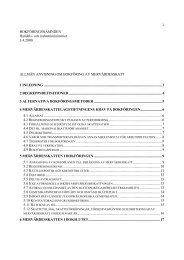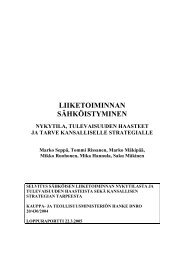Knowledge Intensive Services' Suppliers and Clients
Knowledge Intensive Services' Suppliers and Clients
Knowledge Intensive Services' Suppliers and Clients
Create successful ePaper yourself
Turn your PDF publications into a flip-book with our unique Google optimized e-Paper software.
41<br />
3 Perspectives from (Services)<br />
Innovation Studies<br />
3.1 Innovation surveys<br />
We have cited some CIS2 results as to the nature of KIBS themselves above – soon<br />
internationally comparative CIS3 studies will be forthcoming. Other survey<br />
instruments have been able to examine certain features of KIBS in more depth.<br />
Many accounts of the specificities of services stress the importance of close<br />
interaction with clients. A German survey of service innovation allows one facet of<br />
this to be studied: it asked firms how far their activities were st<strong>and</strong>ardised, as<br />
opposed to being customised to the requirements of specific clients. Hipp et al’s<br />
(2000) data analysis suggested that technology-related KIBS were especially likely<br />
to produce specialised service outputs: 27 % of Technical Services, <strong>and</strong> 18 % of<br />
Software firms, reported more than a third of their output being specialised.<br />
(Comparable figures were 4 % for Banking <strong>and</strong> Insurance [but 18 % for Other<br />
Financial Services], 5 % for Trade <strong>and</strong> 2 % for Transport <strong>and</strong> Communication,<br />
10 % for Other Business Services <strong>and</strong> 4 % for a Residual category.) Overall,<br />
smaller firms were also more likely to be more specialised. Firms that provided<br />
partially-customised or specialised services, too were more likely to report<br />
undertaking innovations than were Wholly St<strong>and</strong>ardised service providers<br />
(controlling for features such as size). And while one third of the Wholly<br />
St<strong>and</strong>ardised innovators claimed that their innovation(s) had an important impact<br />
on their users’ performance <strong>and</strong>/or productivity, over 60 % of the Specialised <strong>and</strong><br />
Intermediate firms thought this to be the case.<br />
The implication is that the latter firms are adapting more of their outputs to suit<br />
specific clients; that they have better underst<strong>and</strong>ing of client features <strong>and</strong><br />
requirements; <strong>and</strong> that they build this underst<strong>and</strong>ing into their services to benefit<br />
the clients. It looks like firms who adapt more of their outputs to suit specific<br />
clients’ needs, have, <strong>and</strong> are able to act effectively on the basis of, superior<br />
underst<strong>and</strong>ing of these needs. Software firms were by far the most likely to claim<br />
important effects for their innovations on their users’ performance <strong>and</strong>/or<br />
productivity, but, surprisingly, Technical Services had only an average propensity<br />
to make this claim.<br />
Firms that introduced more than one type of innovation were most likely to report<br />
important effects on their own <strong>and</strong> their clients’ performance. This was particularly
















